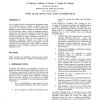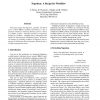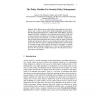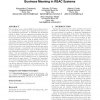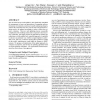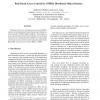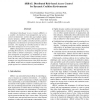99
Voted
SIGDOC
1999
ACM
15 years 7 months ago
1999
ACM
How to structure diverse (documentation) information sources of an enterprise and how to arrange a workflow with access control are two important issues for online authoring and p...
131
Voted
ACSAC
1999
IEEE
15 years 7 months ago
1999
IEEE
This paper argues that Napoleon, a flexible, role-based access control (RBAC) modeling environment, is also a practical solution for enforcing business process control, or workflo...
127
Voted
ICCS
2001
Springer
15 years 7 months ago
2001
Springer
Abstract. Many different access control policies and models have been developed to suit a variety of goals; these include Role-Based Access Control, One-directional Information Flo...
126
click to vote
SACMAT
2009
ACM
15 years 7 months ago
2009
ACM
The role-based access control (RBAC) model has proven to be cost effective to reduce the complexity and costs of access permission management. To maximize the advantages offered...
144
Voted
SACMAT
2010
ACM
15 years 7 months ago
2010
ACM
We propose a new approach for applying Role-Based Access Control (RBAC) to methods in objects in the Java programming language. In our approach, a policy implementer (usually a de...
109
click to vote
SACMAT
2010
ACM
15 years 7 months ago
2010
ACM
The role-based access control (RBAC) has significantly simplified the management of users and permissions in computing systems. In dynamic environments, systems are usually unde...
127
click to vote
WORDS
2002
IEEE
15 years 7 months ago
2002
IEEE
This paper shows how role-based access control (RBAC) models can be implemented in distributed object-based systems that follow OMG/CORBA standards. We introduce a novel approach ...
167
Voted
ICDCS
2002
IEEE
15 years 7 months ago
2002
IEEE
Distributed Role-Based Access Control (dRBAC) is a scalable, decentralized trust-management and accesscontrol mechanism for systems that span multiple administrative domains. dRBA...
129
Voted
SACMAT
2003
ACM
15 years 8 months ago
2003
ACM
In this paper we describe the work devising a new technique for role-finding to implement Role-Based Security Administration. Our results stem from industrial projects, where larg...
128
Voted
DEBS
2003
ACM
15 years 8 months ago
2003
ACM
Research into publish/subscribe messaging has so far done little to propose architectures for the support of access control, yet this will be an increasingly critical requirement ...
